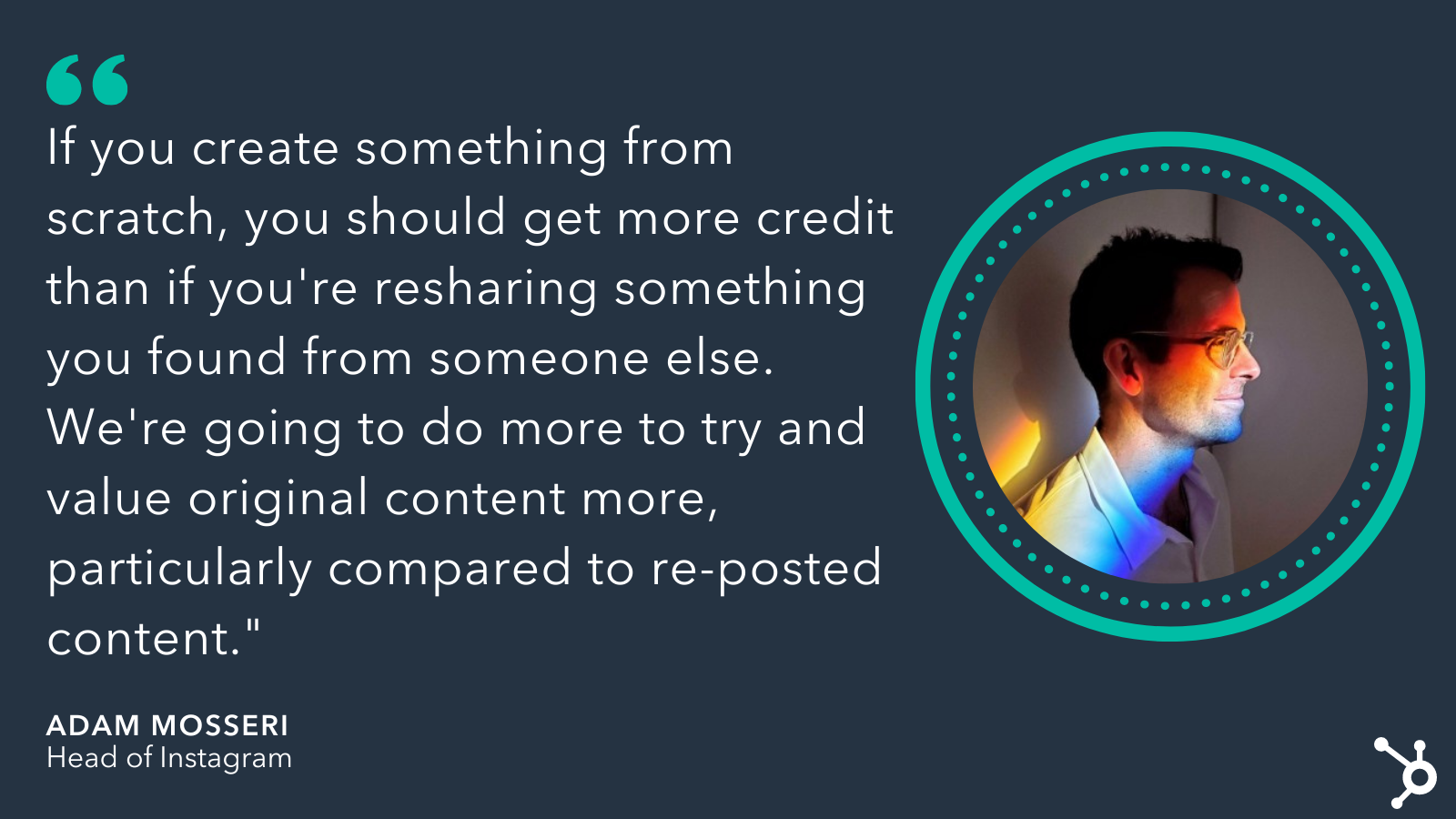Consistently creating high-quality, engaging, and relevant content across social channels can be incredibly difficult and time-consuming for marketers.
To combat those challenges, most marketers have relied on reposting content from other creators and brands as an opportunity to fill in their social calendars and provide valuable content on a more consistent basis.
In fact, reposting is an incredibly popular option for sharing information, funny memes, or interesting trends with your own audiences without needing to re-create the wheel — consider, for instance, how Instagram's #repost hashtag has over 560 million posts.
But as of April 20, 2022, reposted content will no longer be rewarded. Here's what Instagram's new algorithm update means for marketers.
What Instagram's New Algorithm Update Means for Marketers and Creators Alike
Original Content Will Be Prioritized
On April 20, Adam Mosseri, Head of Instagram, tweeted an announcement that Instagram is now ranking based off originality.
As he puts it, "If you create something from scratch, you should get more credit than if you're re-sharing something you found from someone else. We're going to do more to try and value original content more, particularly compared to re-posted content."
On the surface, this seems like a fair deal. If a marketer goes through the trouble to create a unique, original infographic, for instance, she should be rewarded by getting her post ranked higher in the algorithm than someone who is re-posting her same infographic.
Additionally, this is a good experience for users. Instagram users don't want their feeds to be cluttered with all the same content, reposted again and again. Each time they scroll, they want to see fresh, new posts.
However, 'originality' can be a difficult thing to define. For instance: Is it still considered original if it's a branded video that was first posted on your YouTube account, and then re-posted to your Instagram Stories?
Or — what if your CEO is mentioned in another brand's post, and you want to re-share with your own audience?
As Mosseri said on Twitter in response to one question, "The idea is if you made it, it's original. It's okay if you edited it outside of Instagram and then bring it in via the gallery. Identifying 'originality' is hard though, so we will iterate over time."
It's looking like this decision is primarily designed to decrease the amount of aggregator accounts on the social platform — accounts which are focused on compilations of other creators' content, like @HilariousYouTubeVids or @CelebFashionInspo.
Which isn't necessarily a bad thing for marketers. It can be incredibly difficult to get your content in front of new audiences, particularly when you're competing against the same re-posted TikTok video from 50 different accounts.
It's equally exciting for content creators. In the past, if you created a funny Instagram Stories video and someone re-posted it to their Instagram feed where it gained a ton of traction, you wouldn't necessarily reap the benefits from that – the re-poster would get the views, likes, and shares.
Now, Instagram is rewarding originality, so if you're the first one to create and share a piece of content, this new algorithm update should help you remain the sole beneficiary.
 Plus, as Mosseri disclosed in response to another tweet, Instagram's algorithm already prioritizes original content, so this is nothing new. The photo-sharing app is simply leaning more heavily in this direction and re-evaluating the AI systems they currently use to detect original content.
Plus, as Mosseri disclosed in response to another tweet, Instagram's algorithm already prioritizes original content, so this is nothing new. The photo-sharing app is simply leaning more heavily in this direction and re-evaluating the AI systems they currently use to detect original content.
To recap, Instagram's new shift towards rewarding original content will:
- Largely penalize aggregator sites. So if your entire account is based off posting funny videos from other people's accounts, you could see a decrease in ranking. If your account is mostly filled with original content, you shouldn't be impacted.
- Be iterated on over time. Instagram is still working to define what 'originality' means, and as Mosseri puts it, it will take time to get it right when it comes to identifying what's truly original.
- Allow you to post content you've created and edited outside the app. Feel comfortable posting your own content that you've already posted on your other social channels, as well as any content you've edited outside of Instagram. Since you made it, it's still original.
- Reconsider your strategy if you primarily post user-generated content. There's plenty of proof that user-generated content (UGC) is an effective marketing strategy, and it's not going anywhere. However, if your entire feed is made up of re-posted content from your customers, you might want to reconsider the ratio of UGC to original content. To get around this, consider creating original branded content with quotes or short videos from your customers and advocates.
Instagram's Algorithm Update Will Also Offer Product Tags and Enhanced People Tags
This is part of a larger Instagram algorithm update, which will also now offer product tags to everyone (they were previously only given to select accounts), as well as enhanced people tags (which allows you to provide a short description beneath your name that will show up when users click on the tags in a post, like 'Caroline Forsey: Writer').
In response to the question, Why now?, Mosseri says, "As we lean more into recommendations it's becoming increasingly important that [we] don't overvalue aggregators, as that would be bad for creators, and therefore bad for Instagram long term."
Ultimately, Instagram's goal here is to ensure its users' feeds don't just become one big replica of the same few messages. And that's a good thing: It means there will be more space, moving forward, for your branded content to reach new audiences, and you'll see a reward for the hard work of creating unique, one-of-a-kind content.






0 Comments